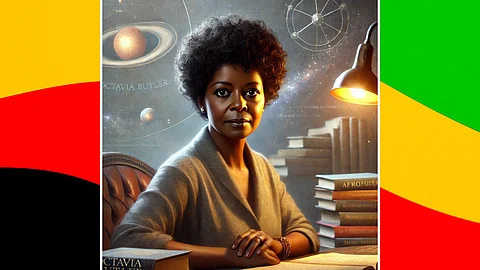
- Home
- About Us
- SOULIVITY TODAY Radio Show!
- COMMUNITY HUB
- GO SHOP by Soulivity!
- ColumnsColumns
- CultureCulture
- Lifestyle
- Contact Us!

When discussing pioneers of science fiction, few names stand out like Octavia Butler. As one of the most influential Black authors in the genre, Butler reshaped the literary landscape by centering Black protagonists, confronting systemic oppression, and imagining future worlds shaped by resilience and adaptability. During Black History Month, it is essential to recognize Butler’s contributions, which continue to inspire new generations of writers, thinkers, and activists.
Born in 1947 in Pasadena, California, Octavia Butler discovered her love for storytelling early in life. She was a shy and introspective child who sought solace in books and began crafting her own stories as a means of self-expression. At a time when science fiction was dominated by white male voices, Butler forged a unique path. She pursued her passion with unwavering determination, despite the challenges of racism and sexism in the publishing industry.
Butler’s work is renowned for its exploration of race, gender, power, and survival. She rejected the common tropes of traditional science fiction, choosing instead to create complex characters navigating worlds that reflected the struggles of marginalized communities. Her groundbreaking novel Kindred (1979) is a prime example, blending historical fiction with time travel to examine the brutal realities of slavery through the eyes of a modern Black woman. This novel remains a staple in both literary and academic circles for its unflinching look at America’s past.
Another of Butler’s celebrated works, the Parable series (Parable of the Sower and Parable of the Talents), envisioned a dystopian future plagued by economic and environmental collapse. These novels, published in the 1990s, eerily predicted many of today’s social and political issues, including climate change, wealth disparity, and the rise of authoritarianism. The protagonist, Lauren Olamina, introduces the concept of Earthseed, a philosophy that embraces change as the fundamental force of existence. The themes of adaptation and survival resonate deeply, particularly among those who see echoes of Butler’s fictional world in today’s society.
Afrofuturism—a cultural aesthetic that blends science fiction, history, and Black identity—owes much to Butler’s work. Though she did not use the term herself, her novels helped lay the foundation for this movement, which has since influenced music, film, and literature. From the works of N.K. Jemisin to the cinematic success of Black Panther, Butler’s legacy is evident in the way Black creators imagine futures where they are not only present but central to the narrative.
Beyond her literary achievements, Butler was a mentor and advocate for aspiring writers. She often spoke about the importance of perseverance, sharing her own experiences of rejection and self-doubt. Her advice was simple yet profound: "You don’t start out writing good stuff. You start out writing crap and thinking it’s good, and then gradually you get better at it." Her honesty about the struggles of the writing process endeared her to many who saw themselves in her journey.
Butler’s contributions were recognized with numerous awards, including multiple Hugo and Nebula Awards, as well as a MacArthur Fellowship—making her the first science fiction writer to receive the prestigious "Genius Grant." Her impact extends beyond literature into conversations about social justice, identity, and the power of storytelling.
Today, Butler’s influence is more significant than ever. Her works are studied in universities, adapted for television, and continue to inspire discussions about the intersections of race, history, and the future. Black History Month serves as an opportunity to celebrate her achievements and encourage new readers to discover her groundbreaking novels.
Octavia Butler’s vision, courage, and storytelling brilliance cement her place among the great literary figures of our time. Her work challenges us to reflect on our world while imagining what it could become. In honoring her legacy, we recognize the power of Black voices in shaping the narratives of tomorrow.
